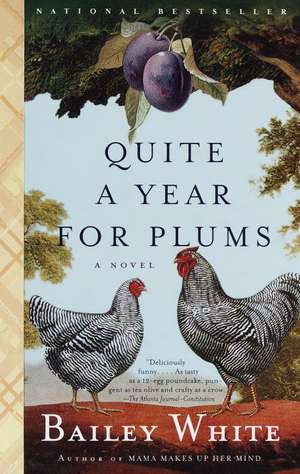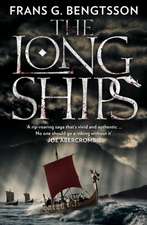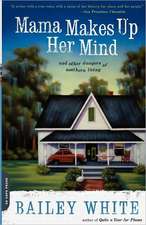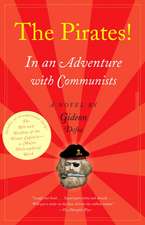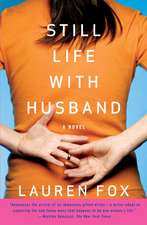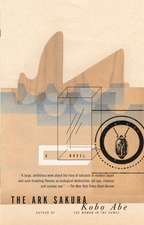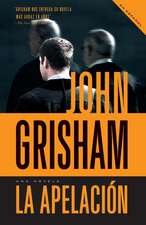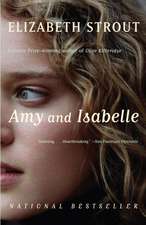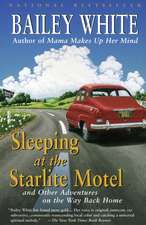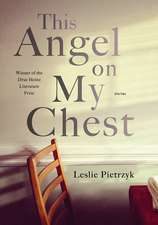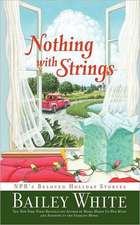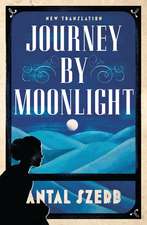Quite a Year for Plums
Autor Bailey Whiteen Limba Engleză Paperback – 31 mar 1999
Vezi toate premiile Carte premiată
Heartbreakingly tender, often hilarious, Quite a Year for Plums is a delectable treat from a writer who has been called a national treasure.
Preț: 102.40 lei
Nou
Puncte Express: 154
Preț estimativ în valută:
19.60€ • 20.34$ • 16.34£
19.60€ • 20.34$ • 16.34£
Carte disponibilă
Livrare economică 03-17 martie
Preluare comenzi: 021 569.72.76
Specificații
ISBN-13: 9780679764922
ISBN-10: 0679764925
Pagini: 240
Dimensiuni: 133 x 207 x 17 mm
Greutate: 0.25 kg
Editura: Vintage Books USA
ISBN-10: 0679764925
Pagini: 240
Dimensiuni: 133 x 207 x 17 mm
Greutate: 0.25 kg
Editura: Vintage Books USA
Recenzii
"White will transport readers to that place where the language is languid, the bees hum . . . and everybody-- in a nice kind of way--is a little off-kilter." --San Francisco Chronicle
"An enchanting work, as delicately stitched as a spider web." --The Philadelphia Inquirer
"A novel of many perspectives. . . . On one level, Quite a Year for Plums is about chickens and peanut cultivars and pine- straw fires; on another, it's about art and impermanence and freedom." --The New York Times Book Review
"Deliciously funny. . . . As tasty as a 12-egg poundcake, pungent as tea olive and crafty as a crow." --Atlanta Journal-Constitution
"An enchanting work, as delicately stitched as a spider web." --The Philadelphia Inquirer
"A novel of many perspectives. . . . On one level, Quite a Year for Plums is about chickens and peanut cultivars and pine- straw fires; on another, it's about art and impermanence and freedom." --The New York Times Book Review
"Deliciously funny. . . . As tasty as a 12-egg poundcake, pungent as tea olive and crafty as a crow." --Atlanta Journal-Constitution
Notă biografică
Bailey White lives in south Georgia. She is the author of the national best-sellers Mama Makes Up Her Mind and Sleeping at the Starlite Motel. She is also a regular commentator on National Public Radio's All Things Considered.
Extras
1 . A G R I S E A R C H
The spring edition of Agrisearch came out with a picture on the front page of Roger standing in the middle of a field holding a peanut plant in each hand. In the distance you could see the irrigation rig behind him, and then the uneven line of trees at the back of the field. The caption said, "U. of Ga. plant pathologist Roger Meadows compares a peanut plant stunted and damaged by the tomato spotted wilt virus (left) with a healthy plant."
For some reason the picture had come out amazingly good in every respect. The frail, sickly plant on the left looked almost weightless, as if it were just hovering between life and death in Roger's tender grasp, while the robust plant on the right seemed aggressively healthy, its dark leaves outlined sharply against Roger's white shirt. The hand holding this plant was slightly lower, as if it were all a strong man could do to support the weight of such vigor.
Roger's friends were all so taken with the picture that they cut it out of their April Agrisearch and propped it up on windowsills or stuck it with magnets to the fronts of refrigerators.
At the Pastime Restaurant the waitresses taped the picture up on the wall beside the "In Case of Choking" poster. Betty, the cashier, wrote "This is Roger, in Albert Bateman's peanut field" on a takeout menu and taped it up under the picture.
Roger's old friend Meade made a mat for the picture out of faded red construction paper left over from her schoolteaching days. In her enthusiasm for accuracy and information, she penned in down at the bottom the date the photograph was taken; Arachis hypogaea, the scientific name for peanut; and then 'Florunner,' the name of the cultivar.
Meade's friend and neighbor Hilma snipped Roger out of the peanut field with a pair of tiny scissors and transposed him onto two color photographs, so that he seemed to hover, artistically stark in Agrisearch black and white, between two lush springtimes--on the left, the bracken fern and longleaf pine woods on the hillside where his family house had once stood, and on the right, the 'Old Blush' in full bloom in his backyard rose garden.
Out in the country Roger's ex-wife's aunt Eula stuck the picture up on the refrigerator beside a crayon drawing of the Titanic her grandson had sent her from California. On the white of Roger's shirt Eula printed R-O-G-E-R in proud capital letters, with the final R dipping down out of consideration for the roots of the healthy peanut plant.
"As if anybody in this house doesn't know who that is," said her son Tom.
"Roger has such a kind face," said Hilma.
"And that well-bred nose," said Meade. "Men's noses become so important when they lose their hair."
"They say you should always label your family pictures," Eula told Tom. "In a hundred years people will forget even Roger."
"Look a there, there's Roger on the icebox!" said Eula's sister Louise.
"Roger ain't family, Mama," said Tom. "Just because he picks the banjo with five fingers and married Ethel before he was old enough to know better,
that don't make him family."
"R-O-G-E-R," said Louise. "They like a word like that, begins and ends with the same letter. But you got that last R so low, Eula, you got to be careful with your spacing, that can throw them off." For several years Louise had had the idea that spacemen were attracted to certain combinations of letters of the alphabet and certain arrangements of shapes and shiny objects, and this made her difficult to reason with at times.
"It's Roger, in Agrisearch, Louise, with his spotted wilt work," said Eula in a loud voice.
"Everywhere I go, there I am, me and those two peanut plants," said Roger. "Fools' names and fools' faces." He and his nematologist friend Lucy were picking his first roses.
"It's just such a remarkable picture," said Lucy.
"Everybody is struck by it. You look so deep, Roger. What in the world were you thinking about?"
"I was just feeling sorry for the photographer is all," said Roger. "He had driven all the way down here from Athens to take a picture of red wattle hogs in Sam Martin's new automatic feeder pens, but they couldn't get the doors to open, so the photographer said, 'Stand out in that field and hold up two peanut plants.' He had to come back the next week for the hogpens."
But even knowing that, people still prized their Agrisearch pictures of Roger in the peanut field.
"Just like Roger to be concerned about the photographer having that long drive for nothing," said Hilma.
"It is a remarkable likeness," said Meade. "It's his mother's nose."
"It was supposed to be two hogs, but they took a picture of Roger instead," Eula told Ethel on Saturday afternoon. But Ethel was looking at the foliage on the roses Roger had brought that morning.
"Roger knows how much I like the pink ones," said Eula, "so he always brings me 'Queen Elizabeth.'"
Ethel turned over a leaf and examined the back of it, but there were no spots on the leaves. "Nobody can grow roses like a plant pathologist," was all she said.
"He planted that rose garden just for her," said Meade, "because she loved them so, and before the 'Dr. W. Van Fleet' got to the top of the trellis she was gone." It was a perpetual conversation, why Ethel left Roger. Lucy and Meade were sitting on stools in Hilma's tiny kitchen watching her poke the stems of 'Madame Isaac Pereire' roses into a vase. The heads were floppy, which made them difficult to arrange, but Hilma loved the fragrance, so Roger saved 'Madame Isaac' for her.
"And for what?" Meade went on. "That little guitar-strumming nincompoop from Nashville with the wispy goatee, when Roger plays the banjo so beautifully. I will never understand Ethel."
"I don't think it had anything to do with banjos or roses," said Lucy. "Ethel is just not domesticated, that's all."
"I saw it with my own eyes," said Meade. "She seduced him right off that stage."
"But we have all reaped the benefits of the rose garden Roger planted for Ethel," said Hilma, in an effort to stem the tide. "So we should not complain."
"Because she liked the way he tapped his feet," said Meade. "And poor Roger, left with nothing to comfort him but the Irish Potato Famine." For two years after Ethel had left him for the Nashville guitarist, Roger had immersed himself in a study of late blight of potato, and that look of resignation, wisdom, and patience had come into his face that was brought out so well in the Agrisearch photograph.
" 'I shall send upon you the evil arrows of famine,' " Meade quoted grimly, " 'and I will break your staff of bread.' "
"Phytophthora infestens, the Great Plant Destroyer," said Lucy. "The science of plant pathology had its beginnings in the Irish Potato Famine. It's very humbling to study a disease like that."
But all this seemed far too gloomy on such a bright spring day, thought Hilma, with 'Madame Isaac' filling the room with its fragrance. It was not fair to blame Ethel for the Irish Potato Famine just because she had such a lively interest in a variety of men. "Ethel is a gifted teacher," she said. "That is an important thing to remember."
"I will never understand Ethel," said Meade. They sat for a minute, admiring that complex picture of Roger, looking so serious and thoughtful on Hilma's cupboard door. For all his Agrisearch wisdom and patience and resignation, still, at the corners of his mouth and in his eyes, squinting slightly in the sun, you could see just the beginning of a little smile, as if he had sense enough to realize that he did look slightly ridiculous, standing there to have his picture taken in the middle of a peanut field.
The spring edition of Agrisearch came out with a picture on the front page of Roger standing in the middle of a field holding a peanut plant in each hand. In the distance you could see the irrigation rig behind him, and then the uneven line of trees at the back of the field. The caption said, "U. of Ga. plant pathologist Roger Meadows compares a peanut plant stunted and damaged by the tomato spotted wilt virus (left) with a healthy plant."
For some reason the picture had come out amazingly good in every respect. The frail, sickly plant on the left looked almost weightless, as if it were just hovering between life and death in Roger's tender grasp, while the robust plant on the right seemed aggressively healthy, its dark leaves outlined sharply against Roger's white shirt. The hand holding this plant was slightly lower, as if it were all a strong man could do to support the weight of such vigor.
Roger's friends were all so taken with the picture that they cut it out of their April Agrisearch and propped it up on windowsills or stuck it with magnets to the fronts of refrigerators.
At the Pastime Restaurant the waitresses taped the picture up on the wall beside the "In Case of Choking" poster. Betty, the cashier, wrote "This is Roger, in Albert Bateman's peanut field" on a takeout menu and taped it up under the picture.
Roger's old friend Meade made a mat for the picture out of faded red construction paper left over from her schoolteaching days. In her enthusiasm for accuracy and information, she penned in down at the bottom the date the photograph was taken; Arachis hypogaea, the scientific name for peanut; and then 'Florunner,' the name of the cultivar.
Meade's friend and neighbor Hilma snipped Roger out of the peanut field with a pair of tiny scissors and transposed him onto two color photographs, so that he seemed to hover, artistically stark in Agrisearch black and white, between two lush springtimes--on the left, the bracken fern and longleaf pine woods on the hillside where his family house had once stood, and on the right, the 'Old Blush' in full bloom in his backyard rose garden.
Out in the country Roger's ex-wife's aunt Eula stuck the picture up on the refrigerator beside a crayon drawing of the Titanic her grandson had sent her from California. On the white of Roger's shirt Eula printed R-O-G-E-R in proud capital letters, with the final R dipping down out of consideration for the roots of the healthy peanut plant.
"As if anybody in this house doesn't know who that is," said her son Tom.
"Roger has such a kind face," said Hilma.
"And that well-bred nose," said Meade. "Men's noses become so important when they lose their hair."
"They say you should always label your family pictures," Eula told Tom. "In a hundred years people will forget even Roger."
"Look a there, there's Roger on the icebox!" said Eula's sister Louise.
"Roger ain't family, Mama," said Tom. "Just because he picks the banjo with five fingers and married Ethel before he was old enough to know better,
that don't make him family."
"R-O-G-E-R," said Louise. "They like a word like that, begins and ends with the same letter. But you got that last R so low, Eula, you got to be careful with your spacing, that can throw them off." For several years Louise had had the idea that spacemen were attracted to certain combinations of letters of the alphabet and certain arrangements of shapes and shiny objects, and this made her difficult to reason with at times.
"It's Roger, in Agrisearch, Louise, with his spotted wilt work," said Eula in a loud voice.
"Everywhere I go, there I am, me and those two peanut plants," said Roger. "Fools' names and fools' faces." He and his nematologist friend Lucy were picking his first roses.
"It's just such a remarkable picture," said Lucy.
"Everybody is struck by it. You look so deep, Roger. What in the world were you thinking about?"
"I was just feeling sorry for the photographer is all," said Roger. "He had driven all the way down here from Athens to take a picture of red wattle hogs in Sam Martin's new automatic feeder pens, but they couldn't get the doors to open, so the photographer said, 'Stand out in that field and hold up two peanut plants.' He had to come back the next week for the hogpens."
But even knowing that, people still prized their Agrisearch pictures of Roger in the peanut field.
"Just like Roger to be concerned about the photographer having that long drive for nothing," said Hilma.
"It is a remarkable likeness," said Meade. "It's his mother's nose."
"It was supposed to be two hogs, but they took a picture of Roger instead," Eula told Ethel on Saturday afternoon. But Ethel was looking at the foliage on the roses Roger had brought that morning.
"Roger knows how much I like the pink ones," said Eula, "so he always brings me 'Queen Elizabeth.'"
Ethel turned over a leaf and examined the back of it, but there were no spots on the leaves. "Nobody can grow roses like a plant pathologist," was all she said.
"He planted that rose garden just for her," said Meade, "because she loved them so, and before the 'Dr. W. Van Fleet' got to the top of the trellis she was gone." It was a perpetual conversation, why Ethel left Roger. Lucy and Meade were sitting on stools in Hilma's tiny kitchen watching her poke the stems of 'Madame Isaac Pereire' roses into a vase. The heads were floppy, which made them difficult to arrange, but Hilma loved the fragrance, so Roger saved 'Madame Isaac' for her.
"And for what?" Meade went on. "That little guitar-strumming nincompoop from Nashville with the wispy goatee, when Roger plays the banjo so beautifully. I will never understand Ethel."
"I don't think it had anything to do with banjos or roses," said Lucy. "Ethel is just not domesticated, that's all."
"I saw it with my own eyes," said Meade. "She seduced him right off that stage."
"But we have all reaped the benefits of the rose garden Roger planted for Ethel," said Hilma, in an effort to stem the tide. "So we should not complain."
"Because she liked the way he tapped his feet," said Meade. "And poor Roger, left with nothing to comfort him but the Irish Potato Famine." For two years after Ethel had left him for the Nashville guitarist, Roger had immersed himself in a study of late blight of potato, and that look of resignation, wisdom, and patience had come into his face that was brought out so well in the Agrisearch photograph.
" 'I shall send upon you the evil arrows of famine,' " Meade quoted grimly, " 'and I will break your staff of bread.' "
"Phytophthora infestens, the Great Plant Destroyer," said Lucy. "The science of plant pathology had its beginnings in the Irish Potato Famine. It's very humbling to study a disease like that."
But all this seemed far too gloomy on such a bright spring day, thought Hilma, with 'Madame Isaac' filling the room with its fragrance. It was not fair to blame Ethel for the Irish Potato Famine just because she had such a lively interest in a variety of men. "Ethel is a gifted teacher," she said. "That is an important thing to remember."
"I will never understand Ethel," said Meade. They sat for a minute, admiring that complex picture of Roger, looking so serious and thoughtful on Hilma's cupboard door. For all his Agrisearch wisdom and patience and resignation, still, at the corners of his mouth and in his eyes, squinting slightly in the sun, you could see just the beginning of a little smile, as if he had sense enough to realize that he did look slightly ridiculous, standing there to have his picture taken in the middle of a peanut field.
Descriere
In her stunningly accomplished first novel, Bailey White, author of "Mama Makes Up Her Mind", introduces readers to the peculiar yet lovable people who inhabit a small town in South Georgia. Heartbreakingly tender, often hilarious, "Quite a Year for Plums" is a delectable treat from a writer who has been called a national treasure.
Premii
- Pat Conroy Southern Book Prize Notable, 1999
